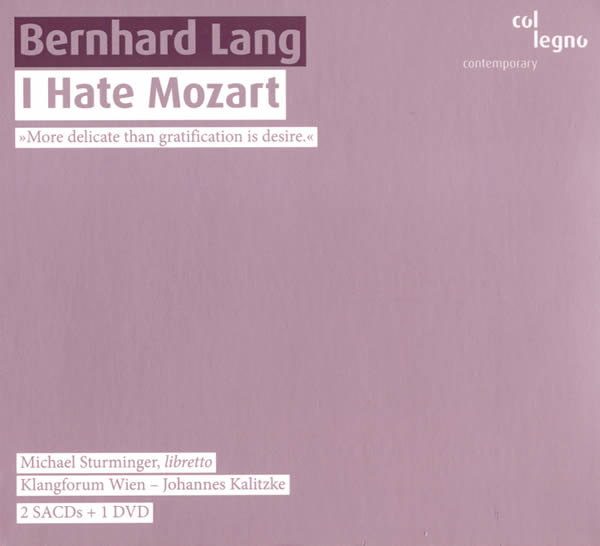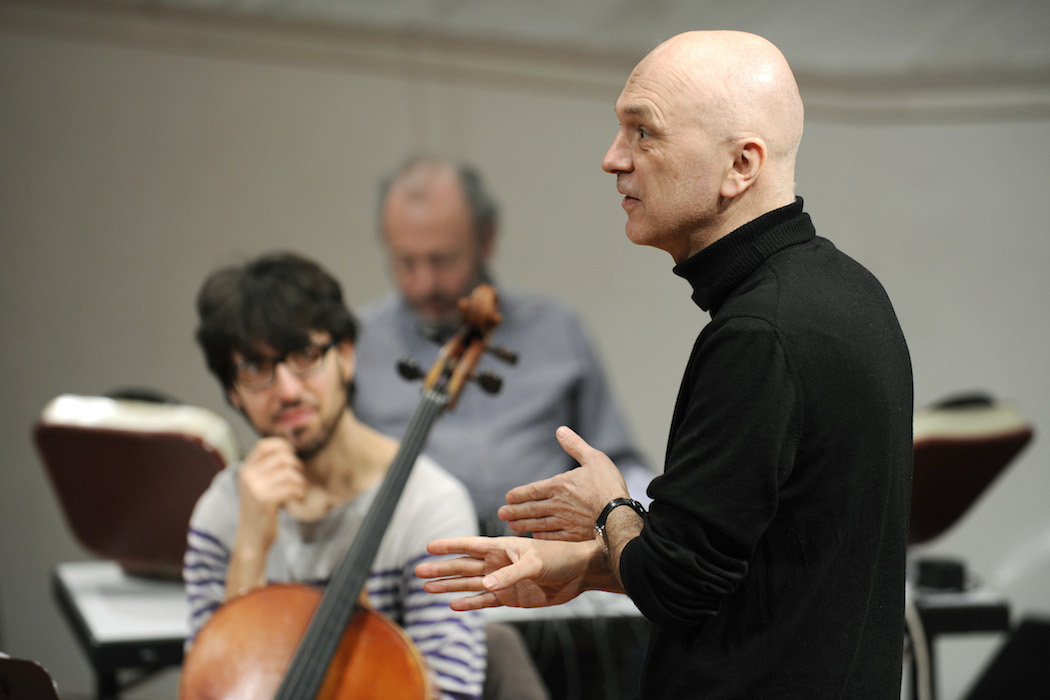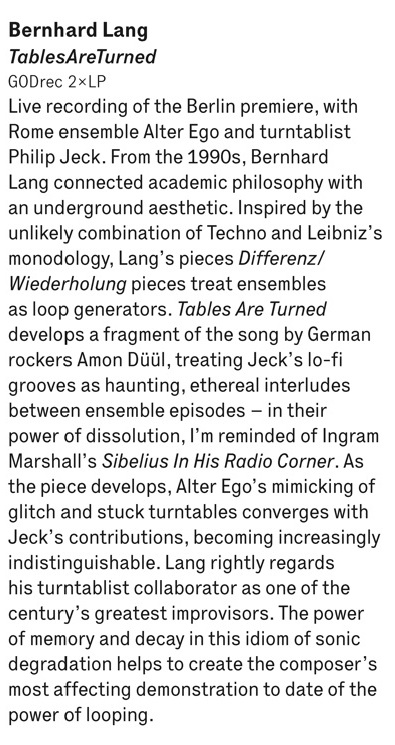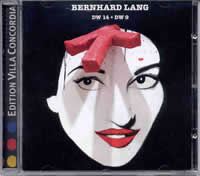
Ima li boljeg naslova za suvremenu operu od Mrzim Mozarta?
Lang je suludo dobar. Shizofrena klasika koja se vrti u centrifugalnom mozgu.
U nenarativnim libretima slaže tekstove de Sadea, Huysmansa, Burroughsa itd.
www.youtube.com/results?search_query=bernhard+lang&aq=f
I Hate Mozart
Das Theater der Wiederholungen
www.youtube.com/watch?v=3TtxSycLpPg
Gaigg / Lang / Ritsch / Harnoncourt: Machine shop #1 from herbst remixed on Vimeo.
V-Trike from autokolor on Vimeo.
2 × hören - Veranstaltung im Konzerthaus Berlin from Martin Hufner on Vimeo.
V-Trike from autokolor on Vimeo.
2 × hören - Veranstaltung im Konzerthaus Berlin from Martin Hufner on Vimeo.
|
|
The non-narrative libretto is in three sections. The first, using texts by de Sade and Huysmans, is in French and is set in the eighteenth century. The second, in English, using texts by William Burroughs,
is set in the nineteenth century, and the third, set in the twentieth
century, uses German texts derived from the Nuremberg trials and reports
from concentration camps. Neither the libretto nor the CD's notes
clarifies what stage action would be involved. Johannes Kalitzke leads the performance by vocal soloists, the instrumental ensemble Klangforum Wein, and the vocal ensemble Les Jeunes Soloistes. The performers sing and play with conviction and panache, making a convincing case for Lang's unique musical language. - Stephen Eddins
samples

Bernhard Lang's ambitious, open-ended cycle of works, Differenz/Wiederholung -- roughly translated as Differentiation/Repetition -- is represented here by three examples that effectively illustrate his methods. DW 8 (2003), for orchestral loops and two turntable soloists, pits the improvisational record "scratching" of Dieter Kovacic and Marina Rosenfeld against the churning patterns of the Symphonie Orchester des Bayerischen Rundfunks, directed by Peter Rundel. Though the overlapping orchestral ostinati and the soloists' random sounds are dense and complex, the aggregate proceeds at a massively slow pace, and sectional contrasts matter more than the close investigation of any single idea. DW 15 (2003), a group of four songs for alto zither, voice, and CD player, is similarly modular in effect, though the looped patterns in Marina Koppelstetter's expressionistic lines and Georg Glasl's scraping zither part change erratically and are utterly unpredictable. DW 3 (2000) is quite concentrated in its short units, and flutist Caren Levine, accordionist Stefan Hussong, and cellist Michael Moser seem tightly focused in their interlocking sequences, which often merge into heterophony. These live performances were recorded in Munich in 2004, and Col Legno has provided clean and finely balanced sound throughout, so the CD seems almost as polished as a studio production. - Blair Sanderson
samples
www.allmusic.com/search/all/bernhard+lang

TablesAreTurned is the first collaboration between one of the most significant Austrian composers of today, Bernhard Lang, and prominent English turntablist Philip Jeck.
There is no doubt that mutual interested in loop technique, led to the musical collaboration between two artists, connecting the worlds of academic philosophy with underground aesthetic.
Unlike his previous works, where Lang was able to transform an ensemble into a big loop generator (his series of Differenz / Wiederholung pieces, accomplished with magnum opus opera, monumental Das Theater der Wiederholungen / The Theatre of Repetitions), here he is turning into cellular automata, generating counterpoint based on the rest of the loops.
On the other side, Jeck offers low-fi locked grooves, making the perfect extended interludes between powerful ensemble episodes.
Premiered at Berlinerfestspiele, but also performed at Wien Modern and Huddersfield Contemporary Music Festival, the piece is now available for the first time in alimited double-vinyl edition.
www.godrec.com
- www.fluid-radio.co.uk/2013/12/tablesareturned/

- The Wire
samples

Bernhard Lang's ambitious, open-ended cycle of works, Differenz/Wiederholung -- roughly translated as Differentiation/Repetition -- is represented here by three examples that effectively illustrate his methods. DW 8 (2003), for orchestral loops and two turntable soloists, pits the improvisational record "scratching" of Dieter Kovacic and Marina Rosenfeld against the churning patterns of the Symphonie Orchester des Bayerischen Rundfunks, directed by Peter Rundel. Though the overlapping orchestral ostinati and the soloists' random sounds are dense and complex, the aggregate proceeds at a massively slow pace, and sectional contrasts matter more than the close investigation of any single idea. DW 15 (2003), a group of four songs for alto zither, voice, and CD player, is similarly modular in effect, though the looped patterns in Marina Koppelstetter's expressionistic lines and Georg Glasl's scraping zither part change erratically and are utterly unpredictable. DW 3 (2000) is quite concentrated in its short units, and flutist Caren Levine, accordionist Stefan Hussong, and cellist Michael Moser seem tightly focused in their interlocking sequences, which often merge into heterophony. These live performances were recorded in Munich in 2004, and Col Legno has provided clean and finely balanced sound throughout, so the CD seems almost as polished as a studio production. - Blair Sanderson
samples
www.allmusic.com/search/all/bernhard+lang

TablesAreTurned is the first collaboration between one of the most significant Austrian composers of today, Bernhard Lang, and prominent English turntablist Philip Jeck.
There is no doubt that mutual interested in loop technique, led to the musical collaboration between two artists, connecting the worlds of academic philosophy with underground aesthetic.
Unlike his previous works, where Lang was able to transform an ensemble into a big loop generator (his series of Differenz / Wiederholung pieces, accomplished with magnum opus opera, monumental Das Theater der Wiederholungen / The Theatre of Repetitions), here he is turning into cellular automata, generating counterpoint based on the rest of the loops.
On the other side, Jeck offers low-fi locked grooves, making the perfect extended interludes between powerful ensemble episodes.
Premiered at Berlinerfestspiele, but also performed at Wien Modern and Huddersfield Contemporary Music Festival, the piece is now available for the first time in alimited double-vinyl edition.
www.godrec.com
- www.fluid-radio.co.uk/2013/12/tablesareturned/

- The Wire















Nema komentara:
Objavi komentar